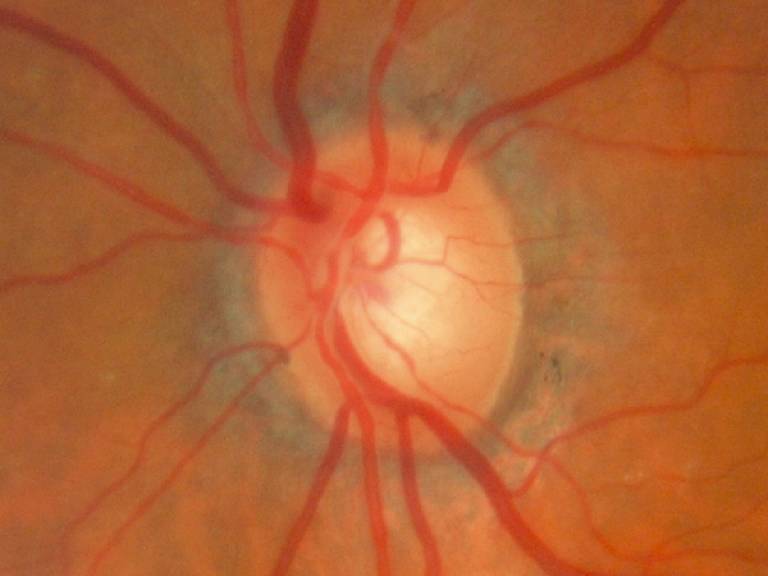A major four-year clinical trial to test the effectiveness of nicotinamide (NAM), a form of vitamin B3, as a treatment for glaucoma is to be led by UCL and Moorfields Eye Hospital researchers.

The team, based at the NIHR Moorfields BRC at UCL Institute of Ophthalmology and Moorfields Eye Hospital, has been awarded a £1.9m grant from the National Institute for Health Research (NIHR).
The trial will eventually recruit 496 glaucoma patients across seven UK sites, with a pilot study starting at Moorfields and Kings College Hospital in London along with a third site yet to be confirmed. It will evaluate whether nicotinamide, a form of vitamin B3 which replenishes molecules important for the functioning of mitochondria (the powerhouses of cells), protects glaucoma patients from progressive vision loss.
The trial builds on collaborative research at the UCL Institute of Ophthalmology, the UCL Queen Square Institute of Neurology and Moorfields, showing that patients with both high- and low-tension glaucoma have lower mitochondrial function than healthy patients; and also that patients with ocular hypertension (higher than normal pressure inside the eye), but no signs of progression to glaucoma, have higher mitochondrial function.
The study will measure the impact of nicotinamide on the capacity of mitochondria in peripheral blood lymphocytes (freely circulating white blood cells) to produce adenosine triphosphate (ATP), which provides energy to help cells function. The study will also investigate biomarkers (biological signs) that can predict disease progression for glaucoma.
Professor Ted Garway-Heath (UCL Institute of Ophthalmology), lead applicant for the grant, said: "We hope to find a treatment that isn't directed at pressure in the eye, but that addresses the susceptibility of the patient to glaucoma. We also hope to identify a blood test to identify which patients will benefit from the new treatment."
Starting in August 2022, the trial will recruit a diverse group of patients recently diagnosed with glaucoma at NHS sites around the country. If treatment with nicotinamide proves successful, it could significantly reduce the damage to vision caused by glaucoma and the cost of treatment for the NHS.
The trial has been funded by the NIHR Efficacy and Mechanism Evaluation (EME) Programme. The programme funds ambitious studies that evaluate interventions that have the potential to make a significant change in the promotion of health, treatment of disease and improvement of rehabilitation or long-term care. Within these studies, EME supports research in the mechanisms of diseases and treatments. EME is a partnership between the Medical Research Council and the NIHR.
The new study will be based primarily at UCL Institute of Ophthalmology, as it has recently acquired a Seahorse Analyzer (with funding from Moorfields Eye Charity), a machine that allows scientists to look at mitochondrial function within cells, the basis for much of this study.
About glaucoma
Glaucoma is a common eye condition in which the optic nerve, which connects the eye to the brain, becomes damaged. The most important risk factors are high pressure in the eye and older age. It is the world's most common cause of irreversible blindness and affects one in 50 people aged over 50, rising to one in 20 in people aged over 80. Sometimes referred to as "the silent thief of sight", glaucoma often has no symptoms until a considerable amount of vision has been permanently lost. Both eyes are usually affected.
Current treatment for glaucoma includes eye drops, laser treatment and surgery. These treatments aim to reduce pressure in the eye, thereby reducing damage to the optic nerve. Although we cannot cure glaucoma, current treatments can slow and sometimes halt its progression. However, many people's condition worsens even with treatment, and some people develop glaucoma with normal eye pressure. Currently, doctors cannot identify who these people will be before treatment.
The clinical trial will involve UCL and Moorfields teams alongside colleagues at King's College Hospital, Portsmouth Hospitals, Norfolk and Norwich University Hospitals, Cambridge University Hospitals, Nottingham University Hospitals and Queen's University Belfast.
Background to the trial
In recent years, researchers have looked at how mitochondria - parts of cells that produce energy - affect how vison could be damaged by eye pressure. The nerve cells in the eye and other cells in the retina need a large amount of energy to function and survive. Older age is associated with mitochondria everywhere in the body working less well and producing less energy.
This new study is the result of a longstanding collaboration between UCL Institute of Ophthalmology and the UCL Queen Square Institute of Ophthalmology, both part of the UCL Faculty of Brain Sciences. The co-applicants for the grant are Professor Garway-Heath, Professor Tony Schapira (UCL Queen Square Institute of Neurology), and Mr Gerassimos Lascaratos (whose PhD was jointly supervised by Professor Garway-Heath and Schapira in 2011-14).
Pre-clinical models of glaucoma have looked at nicotinamide and its effect on mitochondria. Two subsequent small, short-term clinical trials in patients given high doses of nicotinamide showed some increased visual function for a quarter of the people with glaucoma who took part.






